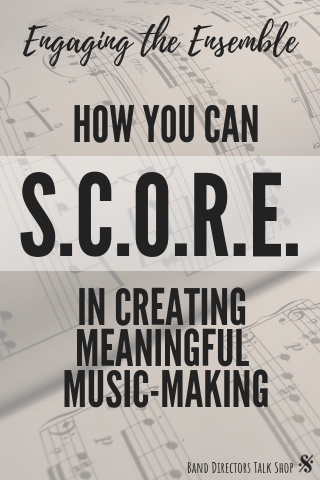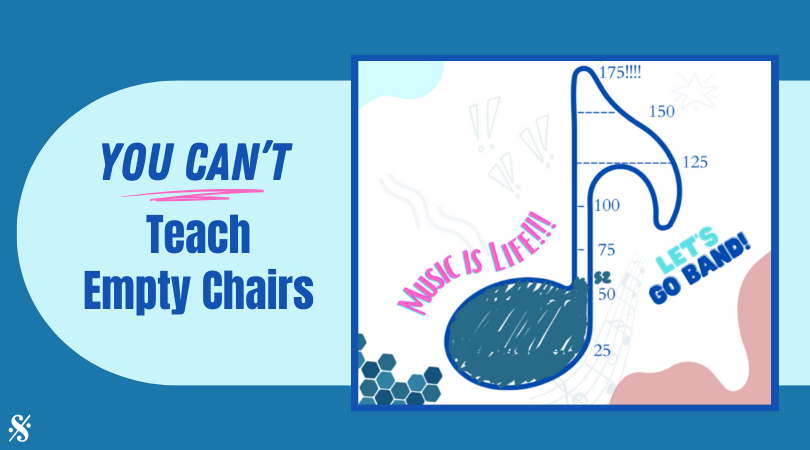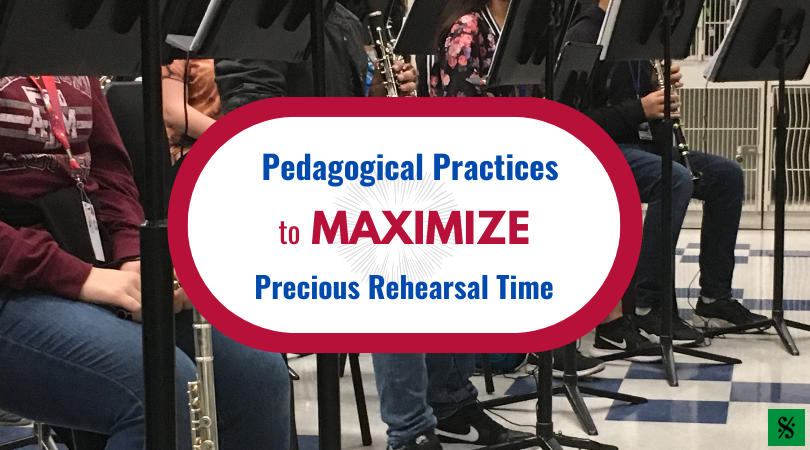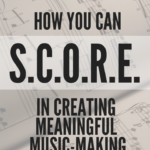Engaging the Ensemble: How Can You S.C.O.R.E. in Creating Meaningful Music-Making
Engaging students is critical to what we do but how do we really know if our students are engaged? Is it a test score? A perfect performance? A silent rehearsal? Have you ever had a student raise their hand and wave it with great enthusiasm, only to ask something totally off topic? Or how about after you give directions to everyone, THAT ONE KID raises their hand and asks, “Why are we doing this?” These could be signs that your students are not engaged.

Engage Right Away!
Microsoft released results of a study a few years ago that showed humans have an attention span lasting about 8 seconds, due to all of the information coming at us these days. Given this, along with what we already know about student learning, it becomes increasingly important for us to find new ways to engage our students. They may be entering our rehearsal from a stressful or over-stimulating part of the school day and need to transition to the “in the zone” music-making space.
One way to engage students is by greeting them at the door by name (“an oldie, but goodie” strategy). It instantly helps set the tone and builds student-teacher rapport. Some more intentionally planned activities might be having a demonstration, a thought-provoking question, music playing as they set up, or a short game, writing, or reading activity ready when they arrive. We can also plan something that is inherently part of the music warm-up (e.g., specifically assigned exercise on the board, section of the piece, musical challenge, etc.). These kinds of “hooks” can help get our students’ attention and provide transitions from wherever they have been to our music-making world.
S.C.O.R.E.
Authentic engagement occurs when what we are doing has meaning and immediate value to the students. Engagement exists when students are attracted to their work, stick with it despite the challenges, and can celebrate their accomplishment. People who are engaged are driven by four goals.
These include:
- Success
- Curiosity
- Originality
- Relationships
- Energy (added later)
How can we incorporate these goals into our rehearsals? The S.C.O.R.E. model asks four focus questions.
Success
What conditions need to exist for students to feel successful? It is important for us to do score study prior to rehearsals, but it’s perhaps equally important for us to identify, model, and sequence the skills our students will need to perform the music. Selecting music within their ability range also allows students to achieve and value progress and see themselves as successful musicians.
Curiosity
When are students most likely to exhibit curiosity? Leading our students to the content is important, but we also need to instill a sense of wonder and curiosity, so they “dig a little deeper” as self-directed learners. Ask questions that will guide them to seek answers, and try to connect the content to relevant life experiences for whatever ages you teach.
Originality
How can we help students satisfy their natural drive toward self-expression? This is a tricky one because we work with individuals who are part of a larger ensemble. We value what makes each student unique, yet we aim for uniformity. It becomes increasingly important to know our students as individuals, and to create ways that motivate everyone.
Relationships
How can we motivate students to learn and foster peer relationships? What activities do you plan that allow for this sort of interaction? I’ve always found that “dividing and conquering” can lead to student success, especially in middle school. It’s good to have peer interactions work for everyone’s benefit, instead of against the teacher as a classroom management issue. Think of ways you can add accountability to student group work. Giving everyone a role during tasks, or even adding a written plan for students to follow, check off, and/or reflect on, are good ways to guide students to develop collaborative skills in a productive way.
Energy
As you begin to plan your next rehearsal or lesson, think about how you might include all of these areas in building momentum. Plan, sequence, and spiral the skills students need to succeed. Provide opportunities that promote student choice and self-directed learning. Foster productive peer relationships among students. Create musical experiences that have purpose, value, and long-lasting meaning. Aim for student engagement over simple classroom compliance. And celebrate student success!
References
McSpadden, K. (2015). You now have a shorter attention span than a goldfish. Time.
Miller, P. (2012). From management to engagement. Edutopia.
Strong, R., Silver, H. F., & Robinson, A. (1995). Strengthening student engagement: What do students want? Educational Leadership, 53(1), 8-12.
Schlecty, P. (January 1994). “Increasing Student Engagement.” Missouri Leadership Academy.
Jenny L. Neff, Ed.D., is Associate Professor and Director of the M.M. and Summer Music Studies programs at The University of the Arts in Philadelphia. She serves as the Eastern Division Representative for NAfME’s Council for Band. Dr. Neff received her Bachelor and Master of Music Ed. degrees from Michigan State University, and her Doctorate in Ed. Leadership from Immaculata University. Website: www.JennysCreativeEDge.com
Related Reading:
Building Intrinsic Motivation in the Music Ensemble: Lighting a Fire in Kids
Motivation, Innovation and Differentiation in Your Beginning Band
Keeping Ensemble Drills Interesting at the Beginning of the Year
If you would like to receive our weekly newsletter, sign up here.
Don’t forget to like us on Facebook too!
Learn. Share. Inspire.
BandDirectorsTalkShop.com






Leave a Reply
You must be logged in to post a comment.